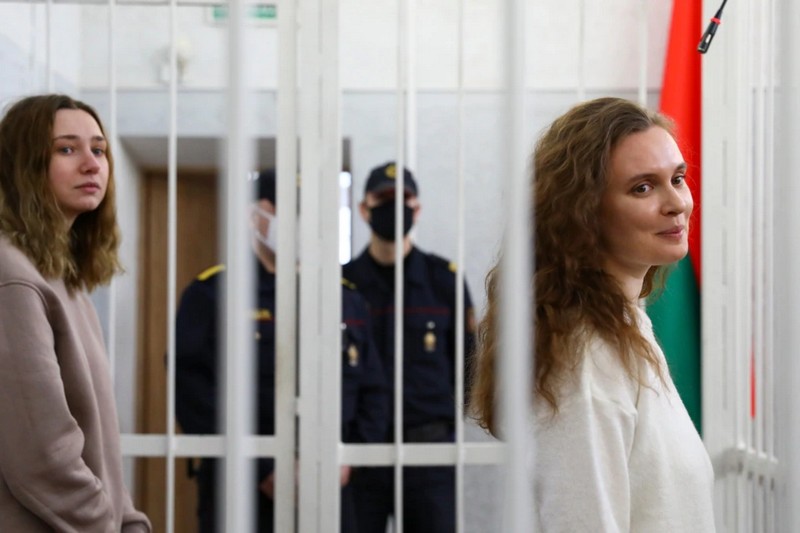Belarus: 2022 another disastrous year for media freedom
Thirty-two journalists currently behind bars amidst continuing legal crackdown. As another devastating year for media freedom comes to a close in Belarus, the International Press Institute (IPI) and our global network today condemn the government’s relentless efforts at prosecuting, jailing and otherwise silencing journalists, as part of a wider campaign aimed at eliminating all forms of dissent in the country.

In a little over two weeks, five journalists and media workers have been detained, prosecuted and put before courts to answer absurd charges reminiscent of Soviet-era practices. They are: Dzyanis Ivashyn, Larysa Shchyrakova, Iryna Slaunikava, Dzmitry Luksha, Henadz Mazheyka.
At least 32 journalists and media workers are currently being held in detention centres and penal colonies, according to the Belarusian Association of Journalists (BAJ), which was liquidated by the country’s Supreme Court in August 2021.
Belarus also has the fifth-highest number of imprisoned journalists in the world, after China, Myanmar, Iran and Vietnam, according to reports.
IPI demands an end to this persecution and to governance by fear in Belarus, a trademark of Alexander Lukashenko especially following mass protests against his rule in August 2020.
In the most recent case on 20 December, the Belarusian Supreme Court confirmed a 13-year prison sentence for Dzyanis Ivashyn, who was found guilty of state treason. According to BAJ, his persecution could be linked to an article he published in 2021, in which he investigated the case of former Ukrainian security officials recruited into Belarus’ anti-riot police force.
On 6 December, police arrested Larysa Shchyrakova, a long-time freelance journalist based in Homel, a major city in south-eastern Belarus. A little over a week later, BAJ informed that a criminal case for “discrediting the Republic of Belarus” had been opened against Shchyrakova. No additional details were available on the accusations made against her. Suspects found guilty of “discrediting” Belarus face up to four years in prison and a fine under article 369.1 of the country’s criminal code.
According to Barys Haretski, BAJ vice-president, Shchyrakova’s case is also serious because she does not reside in Minsk: “The situation outside of the capital is particularly difficult, where the number of independent journalists and activists is lower”, he explained in a phone conversation with the IPI. “In Homel, this may only be a few dozen people”.
“Of course, Belarusian authorities prefer that independent journalists leave: this makes things easier for them”, added Haretski. “Larysa decided to stay in Belarus out of patriotism, and because she wanted to look after her son”, he explained.
Prior to her detention, Shchyrakova had been regularly harassed by police due to her activities, an anonymous board member of BAJ told IPI. Eventually security forces had her record a video in which she stated she was ending her career as a journalist, they added.
“2022 has been another devastating year for media freedom in Belarus”, IPI Europe Advocacy Officer Jamie Wiseman said. “Draconian legislation is making it nearly impossible for journalists to do their job. Laws which forbid ‘discrediting’ Belarus in practice mean that journalists can be jailed for criticizing the government in any form whatsoever.
“We demand that Belarus immediately revoke this and related legislation, which is aimed solely at silencing free press and undermining all dissenting voices, and demand that government and law enforcement authorities end their vindictive persecution of all forms of independent journalism”.
Legal crackdown continues
On 6 December, the Supreme Court of Belarus also confirmed a five-year prison sentence earlier handed to Iryna Slaunikava by a regional court in Homel. On 16 December, the Ministry of Interior included Slaunikava in its list of persons and organizations legally recognized as “extremist”.
The Belarusian journalist, who previously worked for Belsat TV, has been behind bars since October 2021. She stands accused of organizing and preparing actions that “grossly violate public order” and of participating in an “extremist” group. The group in question, according to Belarusian courts and prosecutors, is Belsat TV, an independent media outlet based in Poland. Actions which “grossly violate public order” are reporting for this television channel.
According to Haretski, Slaunikava has been transferred to a penal colony for women in Homel, where she is expected to serve her sentence.
Similar charges were brought against Dzmitry Luksha, a Belarusian journalist who reported from the 2020 anti-government protests for Khabar 24, a Kazakhstani television channel. On 2 December, a court in Minsk sentenced Luksha to four years in prison for, again, “discrediting Belarus” and “organizing or participating in gross violations of public order”. The journalist was handed the prison term after broadcasting videos from anti-government protests for Khabar 24, which, according to prosecutors, contained “deliberately false information”.
On December 1, a court in Minsk opened proceedings against Henadz Mazheyka, a journalist at Komsomolskaya Pravda in Belarus.
Mazheyka stands accused of hate speech for interviewing a childhood friend of a man suspected of murder. Prosecutors interpreted the interview as apologetic of the murder.
According to Haretski, Mazheyka’s case is “incomprehensible”, as authorities claim the journalist incited people to hatred by interviewing a woman who said the suspect behaved well at school. “This makes no sense”, said Haretski.
On 5 December, Mazheyka was also accused of insulting Alexander Lukashenko. The basis for this accusation was Mazheyka’s participation, as a journalist, in a meeting with voters organized by a Belarusian member of parliament. One of the participants of this meeting was recorded using a curse word against Lukashenka, with prosecutors claiming this was Mazheyka. The journalist, however, produced evidence which he claims shows he was not the person who used the curse word.
 @bajmedia
@bajmedia
